Earlham College has once again funded international travel experiences for students pursuing careers in public health as part of a continuing partnership in Latin America.
Earlier this summer, nine Earlhamites, a majority of whom have never traveled outside of the United States, worked alongside medical professionals from the Foundation for the International Medical Relief for Children (FIMRC) across Costa Rica. FIMRC and faculty mentors from Earlham prepared the team of students to participate in public health campaigns, working at mobile clinics and after-school centers to support families from underrepresented populations, including Nicaraguan refugees.
“One of the reasons why I was excited about this program is because I wanted to experience what it was like to interact with another culture in a medical setting,” says Oliver Daniel ’20, a Biochemistry major from Northville, Michigan. “I would like to become a medical professional in the future, and through this program I gained a deeper appreciation for what this career entails.
I’m really appreciative of Earlham’s integration of this funded excursion into my education, because without it, I don’t think that I would pursue this kind of experience on my own.”
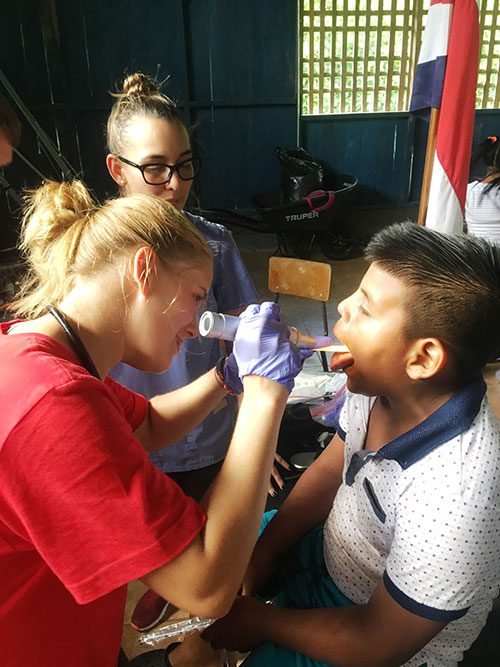
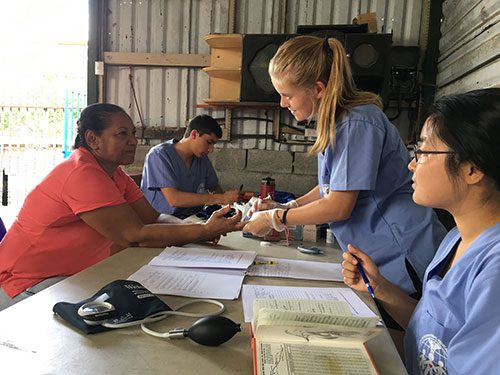
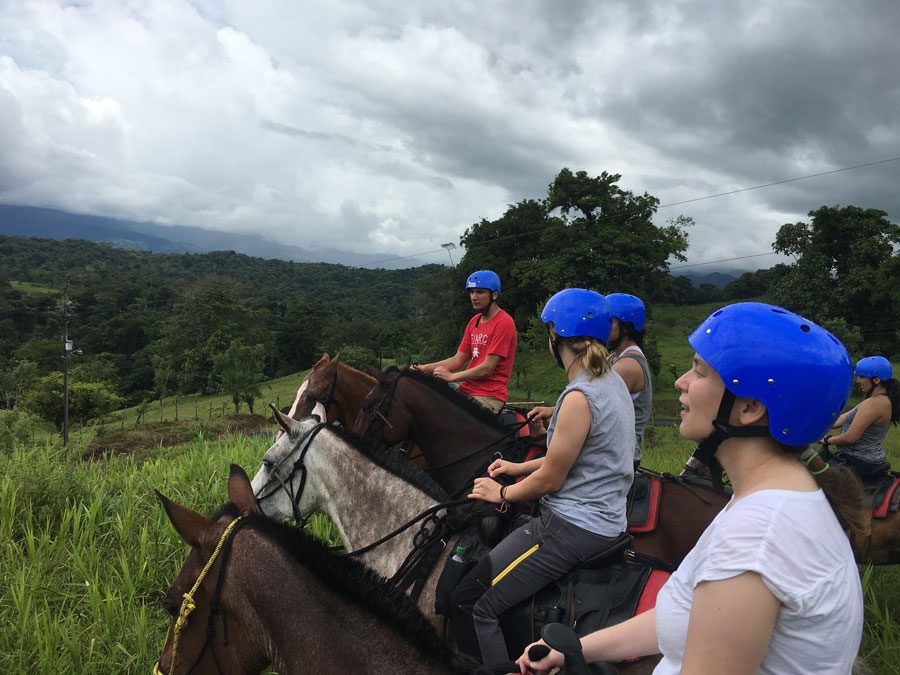
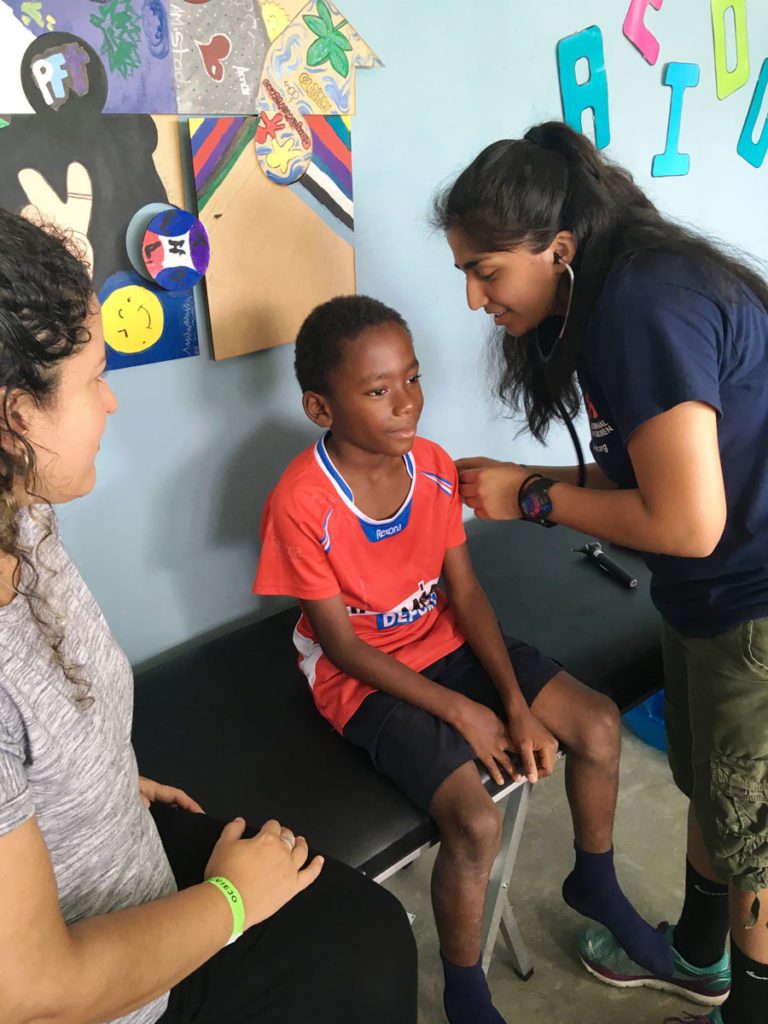
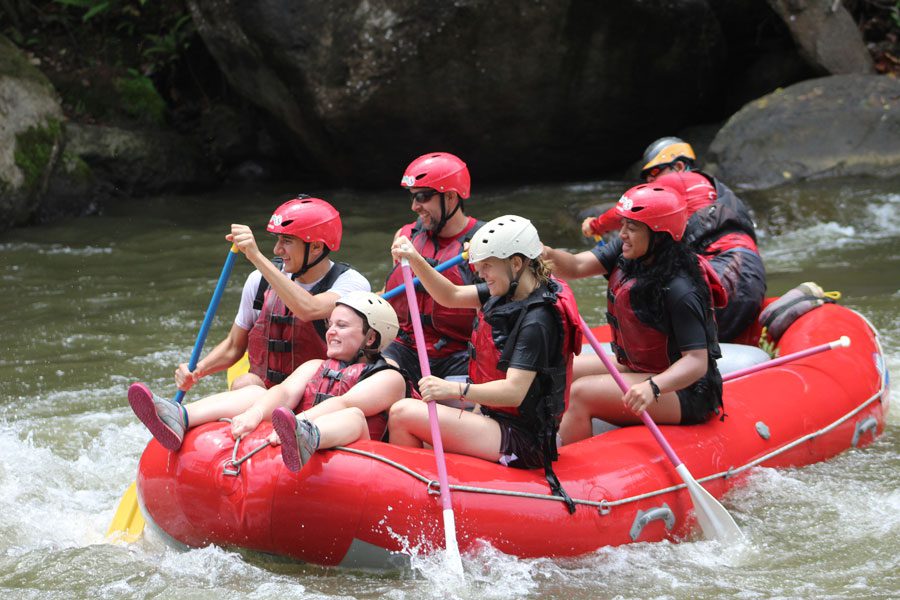
Now in its second year, Earlham is funding this three-week experience as part of the Epic Advantage. Virtually unparalleled in American higher education, Earlham offers every student a funded internship, project or research experience before graduation. The program was offered last year in Peru with support from Earlham’s Center for Global Health.
“I believe that one of the strengths of this program is that our students are constantly stepping outside their comfort zones as they engage in clinical training and medical procedures in places that do not have many resources. You see their growth as students, as people, and as future health practitioners,” says José-Ignacio Pareja, Earlham’s director of the Science and Technology Commons. “Anytime you take students to a place that is very different from what they know, like a developing country for many of our students, the likelihood of them growing is very high especially if they are actively reflecting on their experience and the cultural and ethical implications of the work done.
“All of our participating students have an interest in public health, however, they come from different majors and backgrounds which is an aspect of this trip that I think is very important.”
Professor of Chemistry Lori Watson and Pareja, co-led this year’s trip taking students to cities and rural areas from coast to coast. Students also lived in homestays during the majority of the experience, experiencing Costa Rican culture from the inside.
“Costa Rica is crazy beautiful,” says Denisha Mataia ’19, a Biology major from Vancouver, Washington, who plans to pursue graduate school and a career in nursing.
“There were mountains everywhere! The Pacific Ocean is just as beautiful from their shores as it is from home,” Mataia says. “The people are so friendly, loving and humble.
“What I will take away with me is Costa Rican’s go-to saying, ‘pura vida,’ meaning “pure life” in Spanish. Those are their words to live by,” she says. “They give even if they are not sure if they will ever gain or have much to give because they know life is short.”
In addition to nursing, the Earlham team was comprised of aspiring dentists, pediatricians, physical and occupational therapists, and alternative medicine practitioners. The team took a step toward those goals by learning how to take vital signs, glucose readings, working in a pharmacy, and designing health education programming for children.
“I gained a lot of mental toughness and learned to be quick, flexible and confident while making decisions,” says Vanessa Duran ’20, a Neuroscience major from San Diego, California. “We were tasked with assisting on a variety of different procedures while working with children to educate them about a number of topics related to health.
“We also visited with a shaman and learned the holistic side of medicine and that really changed me,” she says. “In general, everybody who we worked with showed so much love to the women and children who came in for medical care. I realized this is the type of healthcare provider I want to be.”
The students were also supported by doctors and psychologists from FIMRC and received additional mentorship from Dr. Kevin Schmidt Tanager ’12, who is currently conducting his residency in pathology at the University of Chicago.
The excursion represents the very best of an Earlham education, Watson says.
“This program not only reinforces what students are learning in the classroom, it also combines elements of research and discovery, experiential learning, service and social justice,” Watson says. “Our students have learned so much about themselves and gained new perspectives about healthcare in a place very different from where they are from.
“Reflection is also a very important component of this excursion and we made plenty of time for that,” she says. “Most of these students are planning to go to medical school or pursue a career in the health professions, but they will likely be practicing in areas other than Costa Rica. However, the ideas and people and experiences we encountered here will influence the kind of professionals they become.”
Now in its second year, Earlham is funding this three-week experience as part of the Epic Advantage. Virtually unparalleled in American higher education, Earlham offers every student a funded internship, project or research experience before graduation. The program was offered last year in Peru with support from Earlham’s Center for Global Health.
“I believe that one of the strengths of this program is that our students are constantly stepping outside their comfort zones as they engage in clinical training and medical procedures in places that do not have many resources. You see their growth as students, as people, and as future health practitioners,” says José-Ignacio Pareja, Earlham’s director of the Science and Technology Commons. “Anytime you take students to a place that is very different from what they know, like a developing country for many of our students, the likelihood of them growing is very high especially if they are actively reflecting on their experience and the cultural and ethical implications of the work done.
“All of our participating students have an interest in public health, however, they come from different majors and backgrounds which is an aspect of this trip that I think is very important.”
Professor of Chemistry Lori Watson and Pareja, co-led this year’s trip taking students to cities and rural areas from coast to coast. Students also lived in homestays during the majority of the experience, experiencing Costa Rican culture from the inside.
“Costa Rica is crazy beautiful,” says Denisha Mataia ’19, a Biology major from Vancouver, Washington, who plans to pursue graduate school and a career in nursing.
“There were mountains everywhere! The Pacific Ocean is just as beautiful from their shores as it is from home,” Mataia says. “The people are so friendly, loving and humble.
“What I will take away with me is Costa Rican’s go-to saying, ‘pura vida,’ meaning “pure life” in Spanish. Those are their words to live by,” she says. “They give even if they are not sure if they will ever gain or have much to give because they know life is short.”
In addition to nursing, the Earlham team was comprised of aspiring dentists, pediatricians, physical and occupational therapists, and alternative medicine practitioners. The team took a step toward those goals by learning how to take vital signs, glucose readings, working in a pharmacy, and designing health education programming for children.
“I gained a lot of mental toughness and learned to be quick, flexible and confident while making decisions,” says Vanessa Duran ’20, a Neuroscience major from San Diego, California. “We were tasked with assisting on a variety of different procedures while working with children to educate them about a number of topics related to health.
“We also visited with a shaman and learned the holistic side of medicine and that really changed me,” she says. “In general, everybody who we worked with showed so much love to the women and children who came in for medical care. I realized this is the type of healthcare provider I want to be.”
“I gained a lot of mental toughness and learned to be quick, flexible and confident while making decisions.”
Vanessa Duran, Class of 2020
The students were also supported by doctors and psychologists from FIMRC and received additional mentorship from Dr. Kevin Schmidt Tanager ’12, who is currently conducting his residency in pathology at the University of Chicago.
The excursion represents the very best of an Earlham education, Watson says.
“This program not only reinforces what students are learning in the classroom, it also combines elements of research and discovery, experiential learning, service and social justice,” Watson says. “Our students have learned so much about themselves and gained new perspectives about healthcare in a place very different from where they are from.
“Reflection is also a very important component of this excursion and we made plenty of time for that,” she says. “Most of these students are planning to go to medical school or pursue a career in the health professions, but they will likely be practicing in areas other than Costa Rica. However, the ideas and people and experiences we encountered here will influence the kind of professionals they become.”
This excursion will return to Peru next year. A potential long-term plan could be to offer the program in Costa Rica and Peru concurrently, Pareja says.
Such preparation is supported by the Epic Advantage, Earlham’s offer of a funded internship, project, or research experience — for every student, virtually anywhere in the world.
Earlham’s Center for Global Health also offers a growing externship program, a Global Health Epic Term in Central America, a research experience in Thailand, and innovative coursework as part of a Medical Humanities Integrated Pathway. This coursework explores the intersectionality between the natural sciences, social sciences and the humanities and directly supports students pursuing medical school, allied health fields or other related courses of study.
“It has been very rewarding to offer students a transformational, fully funded experience in an area of study that is in high demand,” Pareja says. “Because of support from Earlham faculty, the Epic initiative, and our vast alumni network, we now have two programs in two very different countries that we know work well. I’m excited that this provides an additional way faculty can engage with students in the years to come.”
Media contact
Brian Zimmerman
Director of media relations
Email: [email protected]
Phone: 765.983.1256